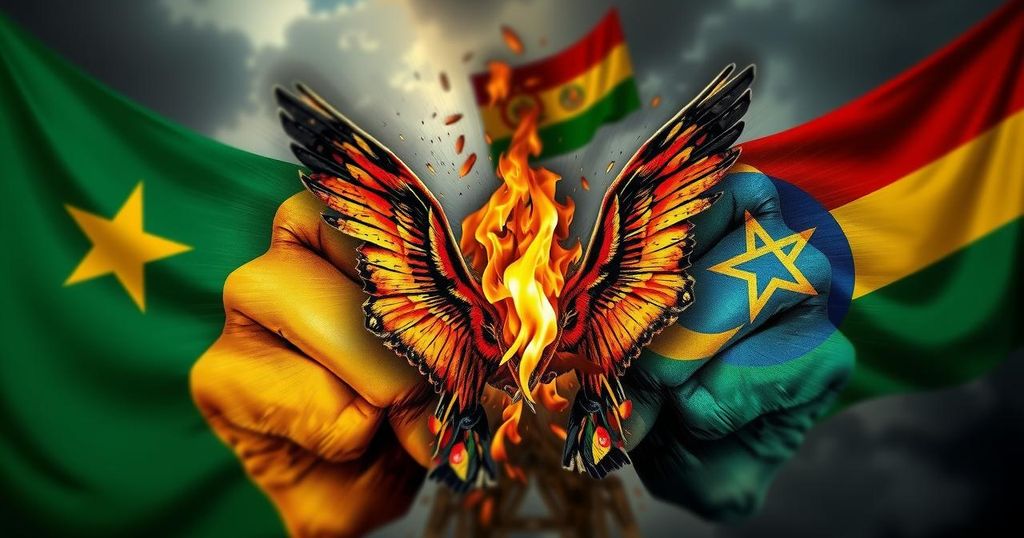Somalia-Ethiopia Diplomatic Tensions Escalate: An Overview of Recent Developments

The diplomatic conflict between Somalia and Ethiopia has escalated, marked by the expulsion of Ethiopian diplomat Ali Mohamed Adan by Somalia, citing interference in internal affairs. Somalia has accused Ethiopia of meddling in their sovereignty through recent agreements with Puntland and Somaliland. In response, Somalia has strengthened ties with Egypt and Turkey to counter Ethiopia’s influence, indicating a rising regional tension.
The recent diplomatic spat between Somalia and Ethiopia has escalated following the expulsion of Ethiopian diplomat Ali Mohamed Adan. Somalia’s Foreign Ministry charged that Mr. Adan was involved in activities incompatible with his diplomatic status, labeling him persona non grata and demanding his departure within 72 hours. This decision stems from allegations that he breached the Vienna Convention on Diplomatic Relations by interfering in Somalia’s internal affairs. This altercation adds to a series of diplomatic tensions following prior incidents, including the expulsion of Ethiopia’s ambassador in April due to accusations of Ethiopia meddling in Somalia’s sovereignty. These tensions were further exacerbated by Ethiopia’s engagements with Puntland, a semiautonomous state in Somalia that has recently declared non-recognition of the federal government’s authority due to constitutional amendments. Ethiopia’s agreement with Puntland to enhance their relations, coming swiftly after Puntland was accused by Somalia of receiving unauthorized arms from Ethiopia, has stirred considerable unrest. Moreover, Ethiopia signed a similar controversial agreement with Somaliland, allowing military and commercial access to the region in exchange for recognition. In retaliation, Somalia has fortified its alliances within the Horn of Africa as well as with nations such as Turkey and Egypt, both of which have vested interests in countering Ethiopian influence. Egypt’s recent defense pact with Somalia and military support, particularly in light of longstanding Nile River water disputes with Ethiopia, signals a strategic alignment against common threats. Turkey, on its part, has bolstered its military presence in Somalia and has endeavored to mediate tensions through diplomatic talks, although progress appears stalled. The interconnected dynamics of military aid, diplomatic agreements, and ongoing territorial disputes in the Horn of Africa complicate the relationships between these nations, potentially setting the stage for further regional instability.
The rift between Somalia and Ethiopia is rooted in complex historical and political grievances, magnified by recent diplomatic maneuvers. The expulsion of diplomats is indicative of deep-seated tensions regarding sovereignty and external influence in national affairs. Ethiopia’s actions in Puntland and Somaliland have raised red flags in Mogadishu, especially as these regions assert varying degrees of autonomy. Meanwhile, Somalia’s alliances with nations like Turkey and Egypt reflect attempts to navigate this precarious landscape while seeking security in the face of perceived threats from Ethiopia.
In summary, the diplomatic tensions between Somalia and Ethiopia signify a profound struggle for sovereignty and regional influence. The expulsion of Ethiopian diplomats highlights Somalia’s growing resistance to perceived foreign interference. This development, alongside Ethiopia’s agreements with Puntland and Somaliland, points toward an increasingly volatile situation in the Horn of Africa. Somalia’s strategic partnerships with Egypt and Turkey further indicate a shift in regional alliances as nations seek to safeguard their interests amid competing influences.
Original Source: www.al-monitor.com








